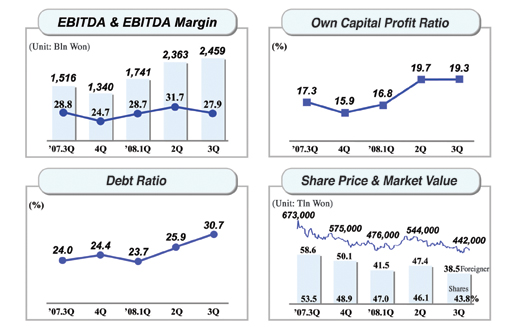POSCO to Invest 6 Tln Won
Steel maker ups investment by 80 pct next year to ensure its competitive edge in world steel industry

POSCO has increased its investment in its domestic steel making facilities to 6 trillion won for next year, the largest amount of investment to be made in a year in its domestic steel production facilities, the steel maker said recently.
POSCO intends to safeguard its future as the top steel producer in the country and in the world and also make its relations with its subcontractors and vendors closer for mutual survival amid tight economic situations. The investment figure is up by 80 percent from this year.
The steel maker, the 5th in the world in terms of annual steel production, announced the news at the event for the declaration of pan-POSCO Mutual Survival Management and Agreement on Fair Transaction, tantamount to POSCO's mutual survival master plan which was held at the POSCO Center in southern Seoul Dec. 11.
Present at the event were CEOs of 13 POSCO affiliated companies led by POSCO Chairman Lee Ku-taek and representatives of 140 subcontractors and vendors of the giant steel maker. Among the dignitaries were Chairman Sohn Kyung-shik of the Korea Chamber of Commerce and Industry, and Chairman Kim Ki-mun of the Korea Federation of Small and Medium Business, among others.
POSCO included the investment plan for next year, in the declaration to show to the SMEs that have dealings with the steel maker that the steel maker truly means to stand together with them in difficult times.
To review the investment plan, POSCO plans to build another steel plate plant in the Gwangyang Steel Complex, capable of producing 2 million tons of steel plates by July, 2010, to bring POSCO's steel plate output to 7 million tons per year, making POSCO, the biggest producer of steel plates in the world.
It would be a great relief to the shipbuilding industry in the country as they don't have to import some 6 million tons of foreign steel plates annually to use them in building ships. POSCO also will expand the steel production facilities in Pohang at the cost of 1.4 trillion won and conduct an overall maintenance services on blast furnace in Pohang and Gwangyang with funds secured from the company's cash reserves and issuance of bonds.
POSCO also plans to kick in 60 billion won to the 400 billion won fund that it operates to provide funds at low interest rates to its subcontractors and vendors. The company has also decided to have all of its affiliates to pay in cash for goods and services provided by SMEs
In the meantime, POSCO has picked the environmentally friendly energy business as one of its next generation growth engines, including the fuel cell battery, and solar power generation businesses, the steel maker said a news release recently.
Korea's largest blast-furnace steel maker has been working on the fuel battery manufacturing business since 2003 jointly with RIST and POSTECH.
POSCO dedicated a 50 Mw fuel cell energy plant in the industrial complex near Youngil Bay in North Gyeongsang Province, the world's largest such plant in September with some 500 guests including Minister Lee Youn-ho of the Ministry of Knowledge Economy and Chairman Lee Ku-taek of POSCO.
The fuel cell plant is the largest such plant in the world taking over from the fuel cell energy plant in Connecticut, the United States, with the capacity only the half of the POSCO plant, POSCO said.
POSCO fuel cell energy plant, capable of producing 50 Mw of power, is able to take care of energy needs for 17,000 households in the nearby area.
POSCO Chairman Lee at the dedication ceremony, said the fuel cell energy business in the best alternative to fossil fuel whose supply is being dried up and taking care of environmental pollution problems.
In this connection, he said POSCO will try to make Pohang, the mecca for fuel cell energy production in the world by turning the fuel battery business into a global one through continued research to improve the business and mass production in line with the government's low-carbon green growth policy.
POSCO officials said fuel cell energy has no energy losses during the production as it creates energy through an electrical chemical reaction from the fusion of hydrogen and oxygen. The electricity generated during the reaction is 47 percent of the total energy created, the level much higher than those of thermal power plants with a large reduction of Co2 during the chemical reaction. nw
3Fl, 292-47, Shindang 6-dong, Chung-gu, Seoul, Korea 100-456
Tel : 82-2-2235-6114 / Fax : 82-2-2235-0799